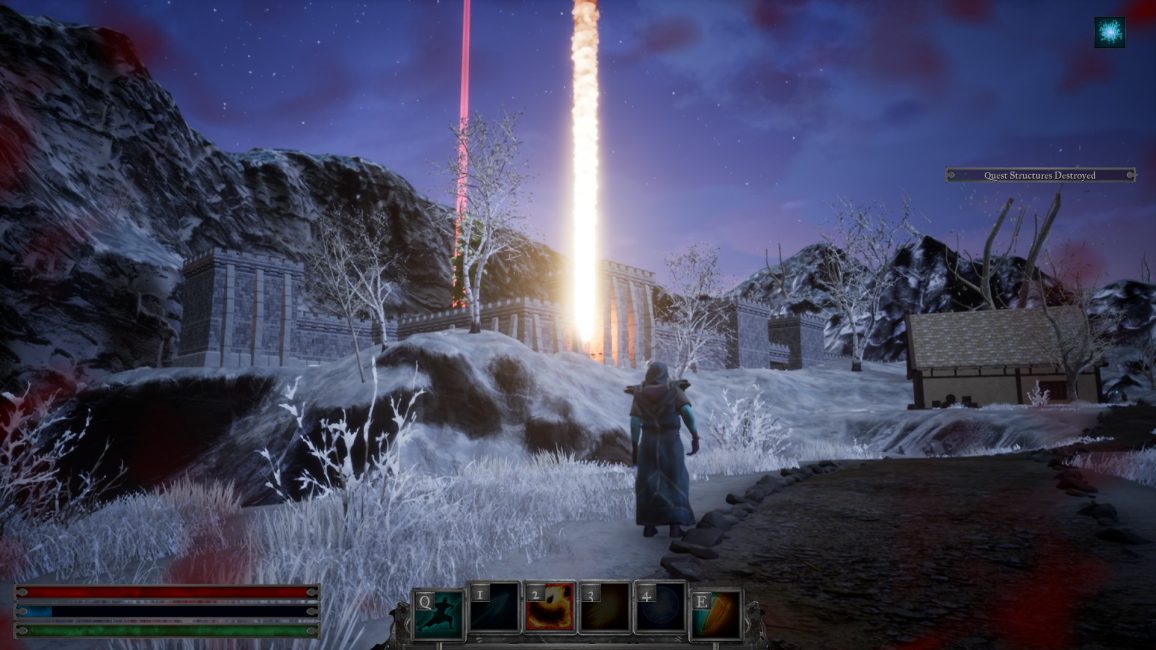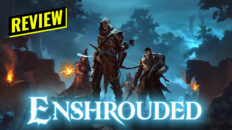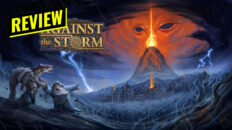Developer: Scraping Bottom Games
Publisher: Scraping Bottom Games
Reviewed on: PC
Code Received
“As the last of the incantation leaves your lips, the sky burns up with the red of a roaring flame. The meteor you called forth rips through the clouds, descending upon the small army rushing towards you. With an ear splitting crash the heat spreads around you, sending both man and stone flying as flames erupt. When the smoke clears little remains of the village and the bandits that stood before you. You are the Fictorum, and this universe is yours to command.”
Fictorum is a rogue-lite, developed by Scraping Bottom Games, around one core focus: blowing things up. And who doesn’t like blowing things up in video games? Built on the Unreal Engine 4, Fictorum boasts two major things: The ability to cast insanely powerful spells, and the ability to destroy your environment with them. It delivers on both promises, and it does that beautifully. Well, almost.
In Fictorum, you play as the last “Fictorum”, a powerful wizard warped by the Corruption and hellbent on revenge. You are the last of your kind, your Order wiped out by the Inquisition in fear of your mighty powers. Crushed by the fear of the Cataclysm, one of your own brought, you travel across the warped land with the singular goal of finding the Grand Inquisitor and making them pay for what they did to your friends.
To do so you have to travel across an FTL-esque map, hopping from peak to peak to make it to the final Nexus. The Catacalysm covered the world in a miasma and humanity fled to the peaks of the world, the only haven from the dangers of the thick deadly fog. Most nodes on the map advance the story with random events of various sorts, with occasional peaks home to visit merchants that can make your journey easier, for a price of course. As you travel across the maps, the nodes you leave behind are overtaken by the Inquisition, much like how the Rebels chase you in FTL.

Each peak on the map boasts a procedurally generated map, so you don’t necessarily visit the same locations on each playthrough. It feels rather novel, especially for the first half hour of the game, but the appeal wears off soon. Fictorum only has a limited pool of resources to pick from, and it doesn’t take long for things to excessively familiar, all the way down to town layouts on some occasions. After all, walking into a town that looks exactly like one you visited a few hops earlier can do a lot to break immersion. Then again, if that annoys you, the Fictorum has enough might to raze everything to the ground.
Nearly every structure in Fictorum is destructible. A single fireball can blow the roof off a house or bring a watchtower crumbling down. The game does nothing to stop you from destroying nearly everything, in fact it feels quite satisfying to send the crumbling remains of a tavern hurtling towards an advancing force of bandits. Or you can make the very bridge beneath their feet crumble. Be careful though as you’re not safe from the destruction you bring. Even with all the magic the flows through you, getting crushed is deadly, and enough rubble can end your life early. Or you might just crush a rare and useful item with the building itself. Luckily you’re able to ‘Rewrite History’, taking your Fictorum back in time to just before you chose to venture to the map of your demise. (Unless you’re playing the game in hardcore mode.)
You can choose to shape the spell by only selecting one of your three runes, or to power it up with all three. This means your spell can fly faster, further, and bring greater destruction than it normally would.
Destroying certain buildings is integral to advancement. Each map has a Nexus, your way out, and often this Nexus is protected by orbs of energy. To free the Nexus, the structures housing these orbs must be destroyed. The only other time you’re required to destroy buildings is when a quest requires you to do so. Even then it’s not necessary. You’ll miss out on a reward, but Fictorum doesn’t punish you for being absolutely evil, or particularly reward you for being benevolent and kind. The Fictorum doesn’t necessarily adhere to the same view of good and evil as we do.
The lack of consequence is another problem of Fictorum. Whether you protect a village from attacking Corrupted or blow it apart with lightning, the game’s story remains unaffected. NPCs feel pointless, you can’t interact with them outside of killing them. They’re mostly mute, and seem to exist solely to run from enemies or die trying. What little interaction you have with characters occurs when you choose a map point. Most of the story and lore is presented through text, organized somewhat in the style of a choose-your-own-adventure game. You talk to some person, or some other event presents the Fictorum with an arbitrary choice that will affect map events, but that’s it. It seems interesting, but ends up feeling a little hollow.

Of course, if you’re able to wield immense power this doesn’t seem to matter much. I didn’t care much for the story events in the game, my attention was completely grabbed by just how great magic feels in Fictorum. There’s three core schools of magic in the game: fire, ice, and lightning. These only determine your initial spells however, and you’re free to build your own interesting library of spells. From calling a meteor down from the heavens to sending out an orb of electricity that shocks everyone it comes across, Fictorum’s spells shine in variety.
That’s not all, however, as nearly all core spells can be expanded upon by the ability to Shape magic. You’re able to equip up to three runes to most spells, each imparting a different benefit should you wish to shape spells. Spell shaping is a core part of the game, letting you hurl multiple orbs of lightning, to sniping an enemy on the other end of the map with a shard of ice. You can choose to shape the spell by only selecting one of your three runes, or to power it up with all three. This means your spell can fly faster, further, and bring greater destruction than it normally would.
Don’t, however, think that you’ll always be able to shape spells to full power all the time. The Fictorum is powerful, yes, but careless use of spells can be just as harmful as dropping a tower onto yourself. Spells consume mana, and the longer you hold onto a spell while shaping, the more mana is consumed. Depleting your mana doesn’t mean the spell will fizzle and fail either, instead the Fictorum begins to draw on his own lifeforce to power the spell. Be too liberal with spell shaping and your own magic will kill you.

With the options the game offers it’s normal to believe that the enemies would require you to use the full extent of your abilities in smart, creative ways.
Spells are not the only customization at your disposal, either. Hidden within the buildings on each map (or on the enemies you kill) are a variety of items. With a multitude of buffs and an array of stats, equipment allows you to shape your power as you see fit. Along with equipment, you may also find scrolls. Scrolls contain unique spells, and their power can be imbued into rings to further power you up with additional spells. These include the ability to telekinetically hurl enemies across the map or conjuring up the Spellblade, a sword of pure magic. Between spell shaping and scrolls, Fictorum makes variety the spice of life, giving you hundreds of ways to bring destruction.
It’s a pity that the enemy AI is so terrible then. With the options the game offers it’s normal to believe that the enemies would require you to use the full extent of your abilities in smart, creative ways. Unfortunately, most enemies are content with rushing headlong at you, while mages hurl spells at you from a distance. Initially I felt like the game would require creative use of my abilities to handle enemies, but soon it was apparent that using the cheapest, most easily powered spell was the way to go. The AI is not creative, and will nearly always just run directly at you, no matter your position on the map. It’s not the power or the brains of the enemies that kill you, it’s just their sheer number. Enemies in Fictorum end up detracting from the overall experience of extreme power.

There’s a few other technical issues that plagued my own experience with Fictorum. While the game gives you the option to play entirely in first person or third person, each time I entered a building the game would snap to a first person viewpoint. It felt awkward and stiff, and resulted in me bringing down a lot of buildings on my head when enemies followed me inside. The animations seem a little stiff as well, and the game tends to feel a little visually outdated from time to time. The appearance, however, does not detract from the spell slinging experience in the slightest.
Overall, Fictorum is an enjoyable experience. It might run out of steam a little too fast, but the fun gained from the destructible environments and the powerful spells is worth it. There’s enough customization to entertain those that enjoy that, and you’re freely able to adjust the game to your preferences (including an FOV slider). It’s therefore unfortunate that the game loses it’s grip far too early. Enemies feel like a hindrance instead of a challenge, you’re never truly able to test all your magic on them, and the lore, while interesting, isn’t presented in a way that’s entirely attractive. However, if all you wish is to wield your magic, and bring destruction to your heart’s desire, then Fictorum might be perfect for you. All in all, it’s something worth taking a look into, at least once.
[full_width]PC Specs:
Windows 10 Pro 64-bit
Intel Core i7-6700HQ 2.60GHz
16GB RAM
GeForce GTX 960M 2GB[/full_width]









